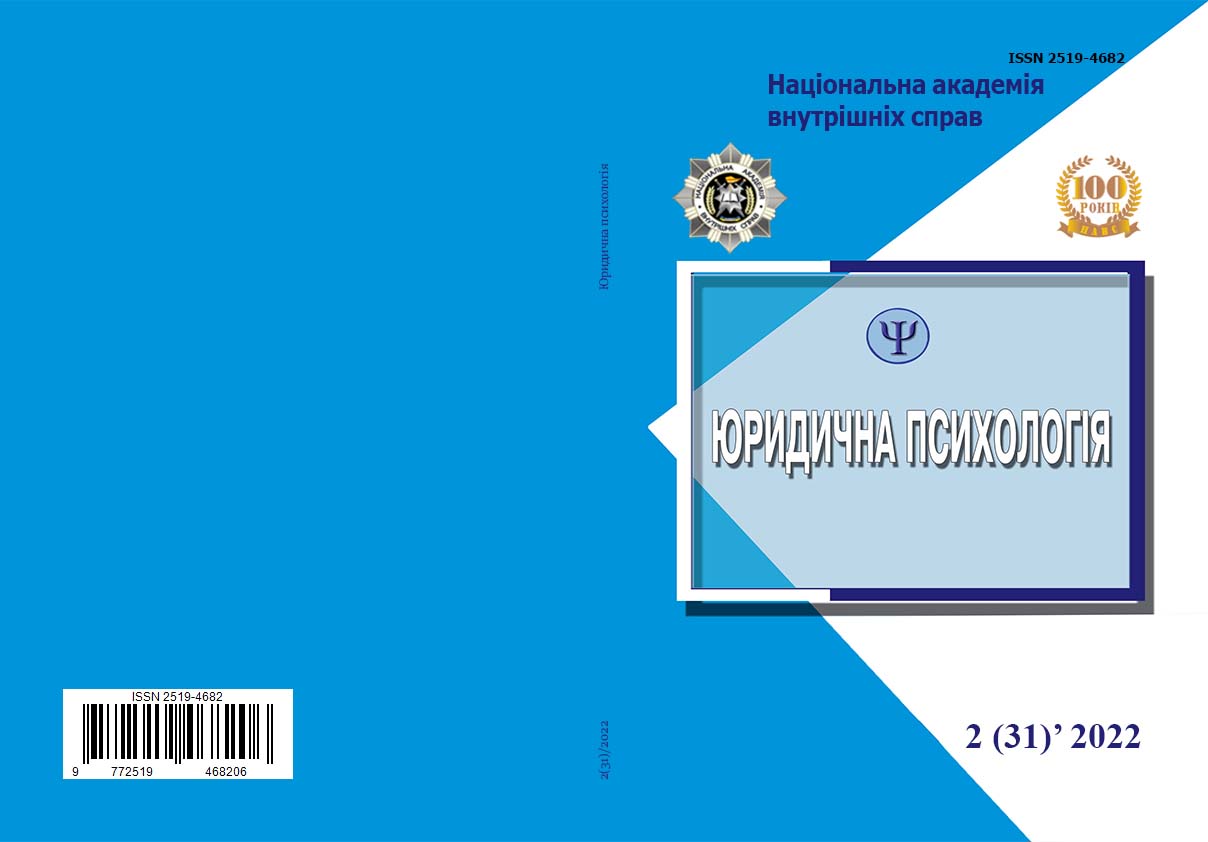Priority Directions of the Development of Polygraphic Activities in Ukraine
Abstract
The activation of polygraph activity in Ukraine convincingly proves its importance in making specific decisions by a certain category of subjects, including in problematic life situations in which a person finds himself. Polygraph data provide collection of necessary information, which is practically impossible to obtain in any other way without using special tools, as well as appropriate methods and methods of psychophysiological influence on an individual in the process of conducting such a study. Evaluating the positive achievements in the development of domestic polygraphology, one cannot ignore its weaknesses, one of which is the legislative instability of the polygraph and related activities. This gap significantly inhibits the full and systematic implementation of the obtained results of studies conducted by polygraph specialists on the order of the initiating parties. The solution to this problem is real and depends not so much on the technical or organizational capabilities of preparing a separate legislative act, but on the political will of domestic parliamentarians, who do not see the feasibility of legalizing the polygraph and activities related to its comprehensive implementation. The purpose of this scientific article is to highlight and analyze the issues raised. Methodology. The research uses the general dialectical method of scientific knowledge of real phenomena related to the regulation of polygraph activity in Ukraine. Results obtained. The scientific opinion regarding the inadequacy of the regulatory legislation existing in our country, which regulates polygraph activity, is substantiated, which thereby creates a number of problems in the issue of the full use of the results of research conducted by specialists using the polygraph. The main positions and arguments of opponents of the polygraph, which are based on the problems of regulating polygraph activity in Ukraine, are outlined. The attention is focused on their inadequate validity of interpretations regarding the full and systematic implementation of this scientific and technical device and the results obtained with its help in certain areas of practical activity. Emphasis is placed on the biased statements of individual practitioners who defend their own position that polygraph tests and their results can take over the functions of basic factual data in making specific decisions by officials, including the collection and use of relevant evidence.
Keywords: polygraph; polygraph specialist; polygraph examination; legislative non-regulation of polygraph activity.
Downloads
References
Ірха Ю., Бутенко О., Погребицький М., Манжай О., Крушинський С. Проблеми нормативно-правового забезпечення застосування поліграфа в Україні. Міжнародний журнал інформатики та мережевої безпеки. 2021. Вип. 21 (12). С. 203–206.
Дмитренко Н. А. Застосування поліграфа у кримінальному провадженні: особливості та проблемні питання. Юридичний бюлетень. 2021. Вип. 22. С. 160–166. DOI: https://doi.org/10.32850/LB2414-4207.2021.22.21.
Линник О. В., Трубнікова А. В. Доцільність використання поліграфа як засобу доказування у кримінальному процесі України. Міжнародний юридичний вісник: актуальні проблеми сучасності (теорія та практика). 2018. Вип. 3–4 (12–13). С. 227–234.
Смірнова А. О., Туровська, А. С., Полуніна Л. В. Спроби правового регулювання детекції брехні під час досудового розслідування кримінальних правопорушень. Експерт: парадигми юридичних наук і державного управління. 2020. Вип. 3 (9). С. 216–222. DOI: https://doi.org/10.32689/2617-9660-2020-3(9)-216-222.
Шевченко С. Суб’єкти адміністративно-правових відносин психофізіологічних опитувань з використанням поліграфа. Конституційне право. Адміністративне право і процес. Фінансове право. Інформаційне право. Міжнародне право. 2019. № 3. DOI: https://doi.org/10.35774/app2019.03.082.
Shumilin S. F., Kupryashina E. A., Novikova E. A., Potapov V. J., Stepanyuk A. V. Limits of Using the Results of Polygraph Testing in Criminal Procedure. Helix. 2018. Vol. 8 (4). Р. 3535–3538. DOI: 10.29042/2018-3535-3538.
Meijer E. H., Van Koppen P. J. Lie Detectors and the Law: The Use of the Polygraph in europe. Psychology and Law: Bridging the gap. 2008. No. 20. P. 31–50. DOI: 10.4324/9781315245713-10.
González V. R., Toledo F. J. C., García-García D., Pardo E. F. V. Jurisprudence on psychophysiological methods in judicial statements as a nexus of psycho-criminological knowledge. Revista Cientifica General Jose Maria Cordova. 2021. No. 19 (36). P. 1065–1080. DOI: 10.21830/19006586.779.
Fischer L., Paul B., Voigt T. Wahrheit unter dem Vergrößerungsglas. Vorstellungen von Subjekt und Technik in der Rechtsprechung zur Polygraphie. Zeitschrift für Soziologie. 2019. Vol. 48 Issue 5–6. DOI: https://doi.org/10.1515/zfsoz-2019-0029.
Мотлях О. І. Поліграф: наукова природа походження, нормативно-правове регулювання та допустимі межі застосування : монографія. Київ : Освіта України, 2012. 394 с.
Лешкович Т. А. Форми використання поліграфа у кримінальному провадженні. Науковий вісник Міжнародного гуманітарного університету. 2013. № 6–1. Т. 2. С. 192–195. (Серія «Юриспруденція»).
Мотлях О. І. Поліграфологія : підручник. Київ : Освіта України, 2022. 550 с.
Мокрицька А., Сліпченко Т. Використання поліграфа у правоохоронній діяльності: досвід зарубіжних країн. Актуальні проблеми правознавства. 2019. Вип. 2 (18). С. 163–168.
Чернєй В. В., Мотлях О. І. Поліграфологічна діяльність як один із перспективних напрямів розвитку Національної академії внутрішніх справ. Науковий вісник Національної академії внутрішніх справ. 2018. № 4 (109). С. 13–24. DOI: https://doi.org/10.33270/011810904.13.
Abstract views: 169 PDF Downloads: 190
- Authors reserve the right to authorship of their own work and transfer to the magazine the right of the first publication of this work under the terms of the Creative Commons Attribution License, which allows other persons to freely distribute published work with mandatory reference to authors of the original work and the first publication of an article in this magazine.
- Authors have the right to enter into separate additional agreements on non-exclusive dissemination of the work in the form in which it was published in the journal (for example, to post an article in the institution's repository or to publish as part of a monograph), provided that the link to the first publication of the work in this journal is maintained.
- The journal's policy allows and encourages the posting of articles by authors on the Internet (for example, in electronic storehouses of institutions or on personal websites), both before the submission of this manuscript to the editorial office and during its editorial processing, as this contributes to the creation of a productive scientific discussion and positively affects the efficiency and dynamics of citing the published work.




